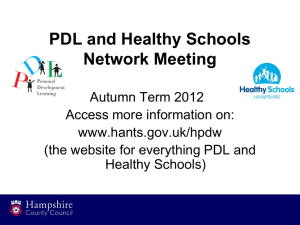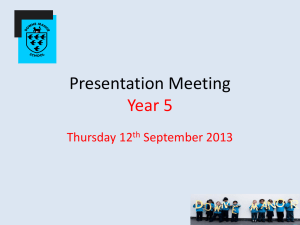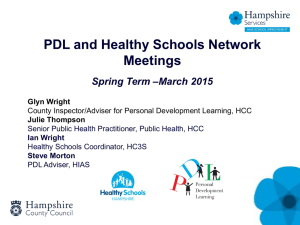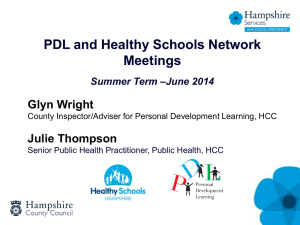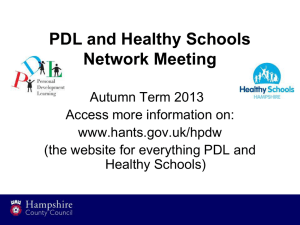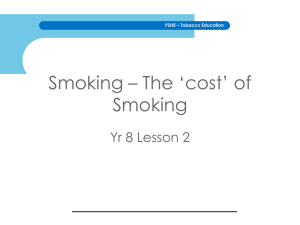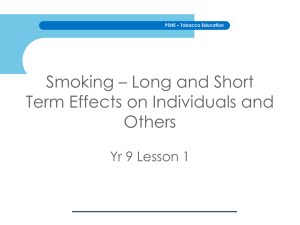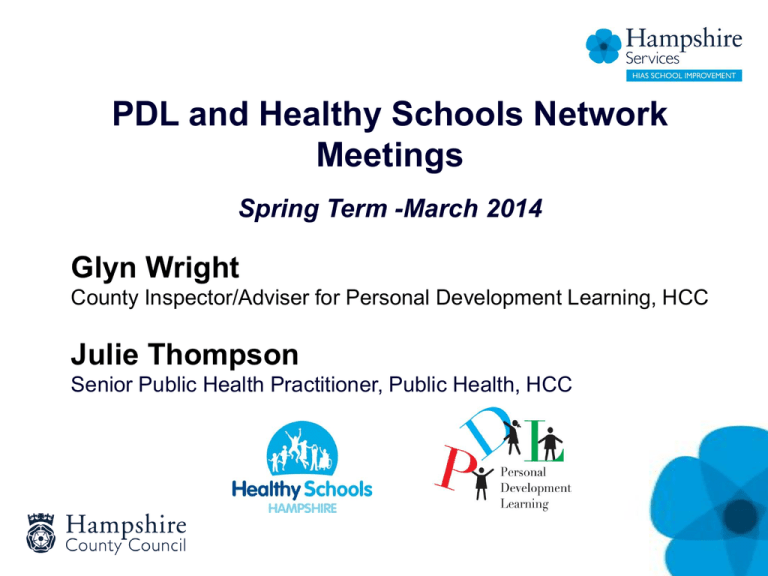
PDL and Healthy Schools Network
Meetings
Spring Term -March 2014
Glyn Wright
County Inspector/Adviser for Personal Development Learning, HCC
Julie Thompson
Senior Public Health Practitioner, Public Health, HCC
MAKING SENSE OF PERSONAL DEVELOPMENT LEARNING
Extended schools
Extra curricular activities
Outdoor Education – e.g
Trailblazers
Citizenship
and Rights
Respect and
Responsibility,
Volunteering/
active
citizenship
e.g. peer
mentoring
PSHE-PW
Study Support
Personal
Social Health
& economic
Education
(PSHE-PW)
Safety
Education
&
Education for
sustainable
development
Functional
skills:
•Communication
•Numeracy
•ICT
•Working together
•Improving own
performance
•Problem solving
Sex and
relationships
education (PSHE
PW)
Social, Emotional
Aspects of Learning
SEAL PSHE PW
Work related learning
PSHE EW
Helping children and young people to:
•Be Healthy,
•Stay Safe,
•Enjoy and Achieve,
•Make a Positive Contribution
• Have Economic Well Being
Religious
education
Physical
activity
Drugs education
incl. alcohol and
tobacco
Personal learning
and thinking skills:
Team worker
Self-manager
Independent enquirer
Reflective learner
Creative thinker
Effective participator
Careers
education
and guidance
PSHE EW
Enterprise education
PSHE EW
Financial
capability PSHE
EW
Individual learning
plans & e-profiles
E-Profile AND PORTFOLIO –
ASSESSMENT, RECORDING and ACTION
PLANNING
Programme
• Healthy Schools – latest news/sharing good
practice
• Upcoming training
• Bikeability
• Change4Life
• The status of PSHE
• Ofsted – new grade descriptor
The PDL/Healthy Schools Team
Julie Thompson
Senior Public
Health Practitioner
Donna Smith
Teacher adviser
Fire Service
Glyn Wright
County Inspector/
Adviser PDL
Eleanor
Jakeman
Freelance PDLpeer mentoring
Sam Francis
Hampshire Leading Teacher
PDL
Chiltern Primary School
Contact details
• Glyn Wright, glynis.wright@hants.gov.uk
• Admin support for PDL/Healthy Schools
Anne McCarthy, anne.mccarthy@hants.gov.uk
Tel: 023 92441442
• Julie Thompson, julie.thompson@hants.gov.uk
• Donna Smith, donna.smith@hantsfire.gov.uk
• Sam Francis, samfrancis.asthants@yahoo.co.uk
• Eleanor Jakeman, eleanor.jakeman@gmail.com
NEW Spring term 2014 –
Curriculum & Qualifications
• All schools must publish their school curriculum by
subject and academic year, including their provision of
personal, social, health and economic education
(PSHE). To support schools in doing this, the PSHE
Association has published its own guidance on
drafting and reviewing a school's sex and
relationship policy and a suggested programme of
study for PSHE. Academies and free schools are also
required to publish information similar to that required by
the regulations relating to their curriculum through their
funding agreements.
So what will your school be
publishing about your programme?
• Discuss
• Ofsted – new grade descriptors published
PSHE Association & partners to draft new
sex & relationships education advice for
schools 1/2014
• The PSHE Association is working with Brook and the Sex
Education Forum on joint advice aimed at helping schools to
bring their SRE into the 21st Century. The new advice will
supplement the DfE’s existing statutory guidance on the
subject (still July 2000!).
• Teachers said that they urgently needed up-to-date guidance
on how to support pupils with modern issues such as staying
safe online. The new advice will address the most pressing
SRE questions asked by teachers.
• Many leading organisations are contributing. They expect to
publish the advice shortly. DfE will help to promote the new
supplementary advice to schools.
Healthy Schools Update
• Well done to Oak Lodge who received confirmation of the Challenge
Award at the last QAG – their priority was Healthy Weights and the
chosen measurable outcome around increasing physical activity
• Schools successfully achieving their Whole School Review:
– Brockhurst Junior
– Cranford Park CE Primary
– Farnborough Grange Nursery/ Infant Community School
– Horndean Junior
– The Key Education Centre
– Lee on the Solent Junior
– Manor Infant (Cove)
– Southwood Infant
– Wellow School
Healthy Schools supporting Vulnerable Children
• 5.2 - How does your school respond to the needs of
all children and young people, including those who
are less vocal and visible?
• 5.3 - What opportunities are there for children and
young people to develop responsibility, build
confidence and self-esteem?
• 6.1 - How does your school identify children and
young people facing challenging circumstances?
What support is provided for these identified
groups?
Pupil Premium and extra funding
• Pupil Premium - £1,300 for primary and £935 for
secondary
• Pupil Premium Plus - £1,900 for CiC and adopted
children
• Service children premium – Ever4 £300
• Sports Top Up – primary – £8000 + £50 per student
• Year 7 Catch Up - £500 for each child not achieving
L4 in Maths and English at the end of KS2 – schools
receive automatically
• Summer Schools – secondary schools can bid for
£250 or £500 per student (one week or two) - only
for Pupil Premium or CiC
Annual Report of the Chief Medical
Officer 2012. ‘Our Children Deserve
Better: Prevention Pays’
• Published Oct 2013
• School can be an important driver of resilience in
children – a protective health asset that provides children
with the learning opportunities and competencies to
develop a positive identity and healthy behaviours…..
• School can also function as a risk to children’s health
and wellbeing. Factors such as the experience of
bullying and poor educational attainment can impact
negatively on children’s mental health status, generating
disconnection from school.
CMO’s Annual Report (cont.)
• There appears to be a strong association between
a sense of belonging to school and wellbeing.
• A number of studies have found that feeling connected
to school (having a sense of belonging in a school)
and/or teacher connectedness (having a teacher who
is interested in you as a person) operate as important
assets (protective health factors).
• School connectedness appears to be generated in
schools through extra-curricular activities, positive
classroom management and tolerant disciplinary
polices.
CMO’s Annual Report (cont.)
Figure 7.1 Assets model to shape health promotion with young people
CMO’s Annual Report (cont.)
• The promotion of physical and mental
health simultaneously can offer great
benefits for children, working dynamically
to create a virtuous circle that keeps
reinforcing overall health, wellbeing and
achievement.
• It is vitally important that all children and
young people have access to good
quality PSHE in schools that supports
their developmental goals and enables
them to successfully negotiate health risk
behaviours and develop positive
personal attributes.
An electric apple, created by
primary-aged children to show
how exciting fruit and veg can
be. Source: Kids Company
National Child Measurement Programme
(NCMP) Results for Hampshire
2007/08 to 2011/12: Year R
In Year R the average obesity prevalence for the 3 years up to
2011/12 was 8.0%. This equates to 1 in 12 of all 4-5 year olds
(approximately 1,000 children annually across Hampshire).
National Child Measurement Programme
(NCMP) Results for Hampshire
2007/08 to 2011/12: Year 6
In Year 6 the average obesity prevalence for the 3 years up to
2011/12 was 15.4%. This equates to 1 in 6 of all 10-11 year olds
(approximately 1,800 children annually across Hampshire).
NCMP Results by School
Headteachers have recently been consulted about
how their school data is made available, for example…
Getting ready for free school
meals for all infants
• Share what you are doing
• What work are you doing within PDL/PSHE
lessons to support the work?
Hampshire County Council is excited to work with passionate schools to
help children enjoy all the benefits connected to cycling. Completely free
to the school and the students, children have the opportunity to learn all
the skills developed during Level 2 Bikeability and have the opportunity to
tackle new challenges that will help them to cycle safely and with more
confidence as part of their level 3 development.
Did you know – about 100 million bicycles are manufactured worldwide
each year!
Following the success of Team GB at London 2012, cycling is at a
national high for popularity & participation. We would like to thank the
schools who have already booked their Bikeability course for the 2014/15
academic year; it is your valued support that ensures the success of this
fantastic cycle scheme. If you have not had the opportunity to book your
place please contact the road safety team: Road.safety@hants.gov.uk
Provide children
with the
confidence to use
bikes.
National Level
standard
trained instructors
–
Children are awarded a
shiny, luminous metal
badge and certificate for
each of the three levels –
in red for Level 1, orange
for Level 2 and green for
Level 3.
Develop positive
attitudes towards
road use.
Bikeability
Children are
empowered with the
skills to carry out a
bike check (instructors
ensure all bikes used during
training are road worthy).
Boost
attendance
and
punctuality.
Bikeability is
the only
Government
approved and
nationally
recognised
award for
cycle training
today.
Students who cycle
to school are more
alert and feel ‘ready
to learn’ when they
arrive.
Benefits of Bikeability to Children
& their Families
Reduce congestion
Quality Family Time
Improve Health
Save Money
Bikeability Funding
• The HSCP is a consortium of the leading cycle training
providers in the county. They work hard to develop the
level 1, 2 and 3 training and are always developing new
and innovative ways to get the most out of the children.
• The Consortium consists of Mountbatten School, Pedal
Power Training, Bridgemary School and British Cycling.
Authority
Price
per
head
13/14
L2
13-14
Hampshire County Council
£40.00
8250
L3
13-14
Total
training
places
Total DfT
funding
13-14
500
8750
£350,000.00
Bikeability Funding (cont.)
- All schools in Hampshire have the opportunity to have
Bikeability delivered to students in Years 5 and 6.
- Level 2 and 3 Bikeability training available to secondary
schools.
- Training is free to the school and free for the children at primary
and secondary levels.
- All instructors qualified at National Standard.
- Minimum 8 hours instruction.
- Bikeability Training is inclusive for all students.
- Helmet and bike provided for any children who do not have
access to there own. Other specialist equipment is available.
Funding is secured up until 2015.
Taking a whole school approach
Assessing,
recording &
reporting the
achievement of
Partnerships C&YP
with
parents/carers
and local
communities
Staff continuing
professional development
(CPD) needs, health &
wellbeing
Leadership,
management &
managing change
Whole
school
approach
Provision of
support
services for
C&YP
Policy
development
Learning & teaching,
curriculum planning &
resourcing
School
culture &
environment
Giving children
& young people
a voice

